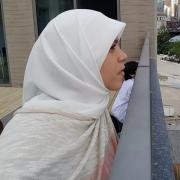Disappointed, pained, hurt, heartbroken, concerned, frustrated, helpless, desperate, angry, and powerless; these are just some of the words that Puerto Ricans living in the United States use to describe how they feel about the events unfolding on the island in the aftermath of Hurricane María. The powerful category 4 cyclone made landfall on September 20, 2017 and pounded the island with a full day of heavy rains and violent maximum sustained winds of 155 mph. Entering though the southeastern city of Yabucoa and exiting through the northern town of Arecibo, María left no stone unturned in her destruction.
Puerto Rico’s residents hardly had time to brace themselves for their second hurricane in a month; the previous, Irma, had ravaged parts of the Northeast on September 7th. Nevertheless, nothing could have prepared them for the strongest storm to hit the island in almost a hundred years. The damage that it left behind has been described as “apocalyptic.”
The entire population was affected. In almost the blink of an eye, electricity and communication were lost as the power grid was knocked out, towers and poles were literally swept away and smashed against the sides of buildings and strewn across the streets. Entire palm trees were uprooted and tree branches flung about, while billboards and rooftops became projectiles, killing anyone in their path. Rivers overpowered bridges, causing them to collapse, leaving whole areas inaccessible, and mudslides buried residents in their homes.
The Puerto Rican diaspora in the United States and all over the world watched in horror as their homeland was devastated beyond recognition. But perhaps the most frustrating ordeal was not being able to communicate with family members to find out if they were safe.
Jose Acevedo, a resident of Maryland whose family is originally from Puerto Rico, has family living in Yabucoa, as well as other parts of the island. Although he was relieved to find out that his family was okay, he is still concerned for their wellbeing. He says, “Many lost their homes. The concern now is that they are running out of food, so although they survived the storm, the aftermath is very precarious.”
Acevedo, a well-known Islamic worker involved with Muslim youth and Islamic education, wanted nothing more than to help the victims of this unprecedented natural disaster, starting with his own family. He planned to travel to Puerto Rico with his father to rescue his stepmother and bring her back to the US.
However, their flight was canceled. In fact, hundreds of flights were canceled as airports were shut down. Even until now the airports are not operating on a regular schedule, leaving many stranded on the island, and others unable to check up on their loved ones.
“It is taking an emotional toll on me on a variety of levels: family members who are in a difficult situation and without communication, the island and its people overall and their condition. It is overwhelming and occupying most of my thoughts,” said Acevedo.
Hoping to help in whatever capacity, he reached out to Islamic NGOs that were planning to offer aid to Puerto Rico. One of these was ICNA Relief, which connected him to an initiative called the 3 Puerto Rican Imams Project. As the name suggests, this project is spearheaded by three Puerto Rican Muslim leaders living in the US, Imam Abdullah Daniel Hernández from Pearland, Texas, Imam Yusuf Rios from Cleveland, Ohio, and Imam Wesley “Abu Sumayyah” Lebrón from Passaic, NJ, with the goal of collecting funds to distribute aid to the areas that were most affected by Hurricane María. They also count on several Puerto Rican Muslim volunteers, as well as Muslims from a variety of nationalities who have unified for the cause. In collaboration with ICNA Relief, they joined a team traveling to Puerto Rico to assess the damage and plan the best strategy for delivering donations.
This is part one of a two-part series on the Muslim community and families in Puerto Rico. Read part 2 here.



The views and opinions expressed in this post are those of the author(s) and do not necessarily reflect those of MomsRising.org.
MomsRising.org strongly encourages our readers to post comments in response to blog posts. We value diversity of opinions and perspectives. Our goals for this space are to be educational, thought-provoking, and respectful. So we actively moderate comments and we reserve the right to edit or remove comments that undermine these goals. Thanks!